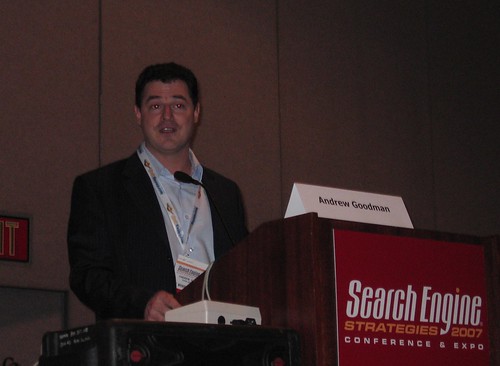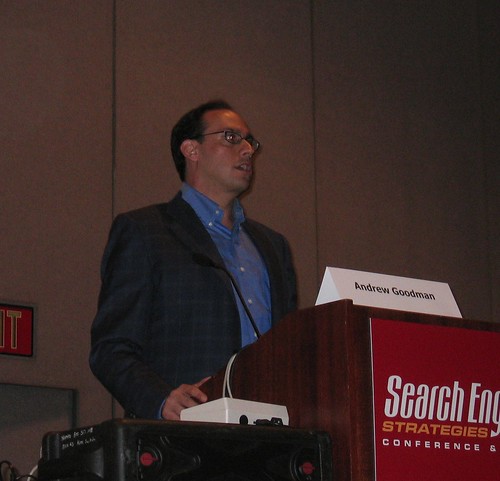What's the most popular search engine? The most used search engine? What vertical areas of search are growing? Are people using search toolbars more or less? Representatives from major ratings and traffic analysis services share stats and info on topics such as these, in this session. Moderator:
* Andrew Goodman, Principal, Page Zero Media
Speakers:
* Jeremy Crane, Director, Search and Online Media, Compete * James M. Lamberti, SVP, comScore Networks * Jon Stewart, Senior Analyst, Industry Solutions, Nielsen//NetRatings * Bill Tancer, General Manager, Global Research, Hitwise
Andrew introduces the session. Here's a picture of him:
First up is Bill Tancer of Hitwise, and he declares his love of data (and people). His blog is www.ilovedata.com. Hitwise is an online competitive intelligence service that monitors 10 million US users and 25 million worldwide. They have over 1200 clients worldwide.
He is recaps all of his old SES sessions (he's been at ten!): - Google is big (and gets bigger) - In market share, Google continues to grows at a rate of 24.3% compared to August 2006. (They track 1,678 search engines in the Us alone.) - Yahoo gained 17.2 while MSN Search decreased. - The top 3 search engines accounted for 80% of all visits (of those over 1600+ search sites). Six months ago, the same engines accounted for 72% (with 2,230 sites in that category). Many of these search engines are consolidating.
We look at search engines by standard metrics and page views and volume of executed searches. The percent of executed searches shows a slightly different picture. The top four search engines accounted for 98.5% of all executed searches. The newcomers, therefore, are not making as much of an impact.
With regards to Google, they consolidated 57 Google domains. The top 3: Google (70.28%), YouTube (10.61%), and Google Image Search (6.5%). Since Google now owns YouTube, it fits in this mix. (By the way, #4: Gmail at 6.16%).
One of the interesting things that they are now tracking is universal search. They did a pre/post analysis of what happened to Google properties now that Google blends its search. News.google.com now is having a downturn as is Google book search. The biggest gain is Google Maps.
Beyond the top 4: human powered search engines do not appear in the top 50 (Mahalo is in the 1400th spot which is right below Google Samoa. ChaCha is in the 400th spot). These new human search engines don't appear to pose a threat to the big players.
The question he's been getting a lot: Is Facebook the next Google? I think they are two different things. Can Facebook get the same kind of hype? Yes, that's the "likeness" it has to GOogle.
Facebook has experienced 2 tipping points according to the statistics - corporate network and opening access to anyone with an email address. There's definitely a market share increase of pages: the site broke into the top 10 of all Internet sites in March 2007. Opening application development could lead to the next tipping point.
Bill Tancer says that he has been getting a lot of friend requests only recently. (Are we surprised? I'm not.) :)
Facebook traffic sources: most sites are dependent upon search engines for their growth. But a site like Facebook is not dependent upon search engine traffic for its growth. Visits between Facebook and MySpace indicate a tolerance for more than one social networks per user. The percentage from email services continue to grow indicating viral spread. - Net communities (33.8%) - Email: proven method of traffic (21.8%) - Portals (11.3%) - Search (9.3%)! - They're probably searching for Facebook in their Google toolbar and getting to Facebook that way. Back in 1995, our internet experience started at a home portal. Then the search engine became the home base. In terms of search, social networks are becoming the new home base for internet user. We see that in the market share. Bettering search within social networks is a growth opportunity in the space. While not a threat to the core mission of search, social networks are quickly becoming the default home base during daily internet use. Future potential to perfect search within social networks as CGM increases long tail.
Hitwise: www.ilovedata.com / Time.com weekly column "The Science of Search"
Next up is Jon Stewart from Nielsen//NetRatings. His presentation is: understanding sources of referral - market analysis and case studies (retail), a customer acquisition strategy and how it plays in with other strategies. The data is obtained from the MegaView search product which focuses on search share, search trends, and keyword intelligence. They also have the MegaPanel-based custom analysis (behavioral data, survey). Today, he will report referral reporting - detailed reporting on sources: where traffic is coming from on all search engines and all sites.
Nielsen//NetRatings sees Google having 53% of all the traffic (in the US). MSN gains share (14%). Yahoo has 20%. Ask has 2%. AOL has 5%.
Let's take a look of search on a customer acquisition strategy: how retailers sell things online and see the effectiveness of each sources. They selected 46 medium-to-large retailers in 4 categories (general merchandise, department stores, specialty apparel, specialty home). The visits were classified into 4 buckets: direct visit, search referral, comparison shopping referral, traditional online advertising referral. These sources were analyzed and then watched which sources resulted in a conversion (purchased immediately following a referral: rigid; or within a day: less rigid).
The majority of people go direct to site (67%). 19% of these people come from search. 2% come from comparison search engines. 12% come from traditional online advertising.
Most acquisiton sources come from direct to the site. Search, while important, plays a bigger role on getting people to the site, but plays a lesser role in actually getting people to transact once they get there.
In the four retail buckets, it's interesting to see that things change: search doesn't play as much of a role in specialty apparel (3%), but it plays a bigger role in general merchandise (10%). Search plays a minor role, but traditional advertising plays a larger role in specialty apparel and specialty home.
What happens if you take a step back and look at just search? It looks like the search market share (Google has over 50%), etc. However, it varies by category in each different retail bucket: MSN is at 33% in specialty home, for example. The other search engines are an influencing factor depending on what category you are looking at.
Case Study: Neiman Marcus Search plays a definite role in getting traffic to the site. Neiman Marcus focuses heavily on Google for transactions (91% of transactions).
Case Study: Amazon Sources of traffic are very similar to the overall search share. But in terms of transactions, it's also similar to the search share (50% Google, 18% Yahoo, 13% MSN, 6% AOL, 1% Ask, etc). Amazon relies very heavily on larger portals and traditional comparison shopping engines.
Case Study: Bed Bath & Beyond If you look at searches on their own, they're relying 25% on traffic that isn't the top 4. Their non-search referrals come from Yahoo mail and MSN Live Mail.
Conclusions: - Inordinate focus on transactions immediately or shortly before purchase risks losing customes during critical earlier stages of the purchase funnel. There are so many acquisition sources that play a large role so you could be losing branding effect. - Traditional online advertising (banners, sponsorships) contributes heavily contribute heavily but not quite as much. They may have greater potential for brand building. - The impact of different means of transaction acquisition varies widely by retail category. - You should not forget the importance of branding and search (affiliates) Next up is Jeremy Crane of Compete: Surveying the Search Landsape (and the consumer side of search).
We all know about Chris Anderson's long tail. When you look at the numbers, it plays out very well. The internet is the quintessential long tail. Within the US, 118 million of people go to yahoo.com (68%). 90% of all online spending is spent on the top 50 sites, so it's extremely concentrated. At Compete, we focus on how to leverage the torso.
The long tail is extremely long in search. MySpace had 133 million search referrals in July. The 4 billion that result in search referrals is less than 4%. Search is the long tail to an extreme.
Google has 66% of market share. MSN has 10%. Ask has 3%, and Yahoo has 20%. - MSN has been successful at growing their panel (and this excludes computing Club Live) - But Google has grown a lot relative to the other players. - Yahoo has gone down. They're showing the most decline over the past 13 months. - The rest of the market share is 1-2%. We want to think about market share in a different way. None of your target customers are average. Let's look at segmentation (men/women, senior/teenager). Men typically have a 4% greater likelihood of using Google greater than the overall market. Women are using Yahoo, MSN, and Ask significantly more than the market share. But when looking at the seniors: significant less use of Google, but increased usage of Yahoo, MSN, and Ask. Teenagers tend to move with the "average."
Google's market share for liberals and conservatives. Both liberals and conservatives favor Google more than the overall population. Politicians might want to think about this. - Liberal - 80% - Conservatives - 73% - Overall market share - 66%
Searchers don't care about market share. You can have groups of people that are exclusive to one engine or you can have people who spread their searches around and use more engines differently than others. People tend to be very focused. Airline searches - term based classifications: among airline searchers, Google users (82%) search only on Google. 66% of MSN users search only for airlines on MSN Live. You're going to miss out on a significant segment of the population if you center your marketing on one engine.
Search is more than direct response: There's no such thing as a new internet user. We're all very comfortable as search being a direct response. There's this whole world of search beyond the major engines. Case study: 62% of search related activity happens prior to the purchase. Searchers are less specific earlier in the process before they've made their decision. At that point, they are most susceptible to influence. (e.g. search for "sedan" and end up with Toyota Camry)
What does this mean to search marketers? - Be in more than one place at the same time. If not, you will miss a portion of your customers. - Know your target consumer. Basically, on the highest level of market share, you're not going to be optimized. Think about where they are, what they're searching for, when they're searching for it, etc. - Say the right thing at the right time. If you're putting a message in front of a consumer that says "Buy now" and they're considering their options in advance, it won't resonate. Last up is James Lamberti of comScore Networks.
 He was on embargo: he announces today's (!) launch of qSearch 2.0: The Next Generation of Search Measurement - New Measurement for an Evolving Market.
He was on embargo: he announces today's (!) launch of qSearch 2.0: The Next Generation of Search Measurement - New Measurement for an Evolving Market.
comScore is a market research firm and monitors behavior of 2 million people globally. They watch industry trends in 32+ countries. They have a variety of metrics and data streams.
Who, what, why, and where? The audience is critical. We need to know if it's a man, woman, the age, etc. We need to understand their actions - how does search impact conversion? What is the timeline of search? What about location? What is the impact or the attitude?
qSearch provides clients with in-depth analysis of consumer search activity across a vareity of metrics: - Search queries - Paid search impressions - Paid clicks - Natural clicks - Conversion
The market can be analyzed in a variety of ways: core web search, local search, image/video search, auto search, extended search, toolbar search.
The market is evolving. We need to the expand collection of search data both wihin existing markets as well as expansion into new markets. There is a need to watch how search integrates with the rest of media. There's a tremendous opportunities for marketers to tap into social networks and that's why comScore is expanding their service offerings to capture this.
We want to give a fair and consistent tratemtn of todya's major search players regardless of taxonomy, technical implementations, business relationships/partnerships.
qSearch 2.0 positions itself to scale into new verticals: travel, shopping careers.
Why the need for this? The opportunity presented for monetization in different networks (Google, Google Video, MySpace, YouTube, etc.) is important. Is any particular search any less valuable? Is the behavior of the consumer any much different?
When we look at the top 50 properties, there is massive growth of queries. Market growth is remaining very strong. Search intensity shows that unique searches (and searchers) are increasing. Searches per searcher are increasing.
You have a very focused set of consumers who drive a tremendous amount of volume (20% of searchers drive 70% of traffic), and therefore, you might be talking to the same people.
Market share: Google continues to grow leaps and bounds above other competitors but Microsoft and Ask have managed to hold share in the face of a lot of larger players. But in terms of Google vs. the others, Google is performing a lot better.
Paid clicks: 34% increase. Yahoo is doing extremely well in terms of their paid clicks in terms of their Panama products.
In terms of Expanded search: - There are over 1 billion queries on YouTube. - MySpace- #4 search engine in the US? They should take advantage of leveraging their search. - eBay is bigger than Ask and AOL Search.
In terms of global search players: Baidu.com is over 2 billion queries worldwide.





